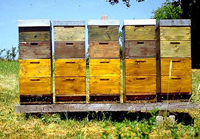|
Bee
Fees Jump a Bit
Some Oregon blueberry growers will be paying a few dollars more
for honey bee rentals this year, thanks to increasing fuel costs.
“Most beekeepers last year were around $45 (a colony), with
some as low as $40,” said Canby beekeeper Chuck Sowers.
“Most of them are thinking of going up a few dollars mostly
because diesel has gone to $3.75 a gallon and is still going up,”
Sowers said mid-February. “I wouldn’t doubt that some
of them hit $50.”
McMinnville beekeeper Nick VanCalcar said prices are ranging from
$35 to $45. “Maybe a couple guys are above that. There may
be some bargains below that, but I’d be leary of them.”
 Sowers,
who turns his little workers loose in Willamette Valley blueberry
fields in April and May, said that in reality beekeepers are trucking
companies. “You’re moving them around all the time and
going to look at them.” Sowers,
who turns his little workers loose in Willamette Valley blueberry
fields in April and May, said that in reality beekeepers are trucking
companies. “You’re moving them around all the time and
going to look at them.”
He added that most growers allocate two colonies per acre. “When
you start getting more than two, it’s way too much competition
for the bees. I know there are people in the Valley who put out
as many as four (per acre).”
VanCalcar, who took close to 3,900 hives to California and will
put 2,000 of those into Willamette Valley blueberry fields, said
he’s heard of some growers who use up to five and a half colonies
per acre. “They’re going to make sure they get their
pollination.”
Sowers and VanCalcar said they believe that pollinations will come
off better if palletized colonies are grouped together four to eight
pallets at a time rather than stringing out the colonies.
Bees will forage at greater distances from the hives when grouped
together, Sowers said. VanCalcar added that stringing out hives
also means more work for beekeepers in dropping them off and picking
them up.
Since maple trees can attract bees away from blueberries, VanCalcar
said bees should be positioned so that they have to travel across
the field to get to the maples. When in doubt about hive density
and placement, Sowers tells growers to talk to their fieldman.
It’s much easier for beekeepers to position pallets in fields
that are machine picked because of the wider roads, which are needed
for picker turnarounds, Sowers said. “If you have less than
a 20-foot road, it makes it real difficult (to unload and spot hives)."
Oregon beekeepers earn a good chunk of their incomes each year pollinating
almond trees in California, where various reports say rental fees
this year ran from $130 to $160 per hive.
Thanks to almonds, which are pollinated in February and March, beekeepers
are able to rapidly build up their colonies for the pollination
later on of tree fruits, berries, vegetables and vegetable seed
crops in the Northwest. “Even in a bad weather year, hives
will come back booming with brood,” VanCalcar said.
Sowers, who runs around 1,400 hives, 600 of which will go into blueberries
and the others in pears and cherries, said that while colony collapse
disorder (CCD) continues to be a major concern in other parts of
the country, Oregon so far has been pretty much immune to the mysterious
syndrome that has wiped out tens of thousands of hives in the last
few years. “Last year and this year we’ve had very small
losses (10 to 15 percent).” He puts most of the blame for
losses on lethal mites and not CCD.
|
Articles:
Message from the Chairman
Spotted
Wing Drosophila Update
Market
Outlook:
A Look Back …
and Ahead
Bumbles
and Blueberries
Organic
Blueberry Production Research Project
Critical
Program Needs Industry Support
Small
Growers to Receive GAP Certification Aid
Oregon
Fresh Season Promotion On a Roll for 2011
Bee
Fees Jump a Bit
Smooth
Move Increases Insulin Sensitivity
New
Trap Hits
the Spots
(Spotted Wing Drosophila)
OSU
Researcher Driving Blueberries up a Tree
USHBC
Unveils New “Little Blue Dynamos” Positioning and Campaign
for Highbush Blueberries
Watching
World Acreage and
Production Grow
Specialty
Crop Grant Supports Oregon Berry Festival;
Free Berry Vendor Space Available
|

 Sowers,
who turns his little workers loose in Willamette Valley blueberry
fields in April and May, said that in reality beekeepers are trucking
companies. “You’re moving them around all the time and
going to look at them.”
Sowers,
who turns his little workers loose in Willamette Valley blueberry
fields in April and May, said that in reality beekeepers are trucking
companies. “You’re moving them around all the time and
going to look at them.”